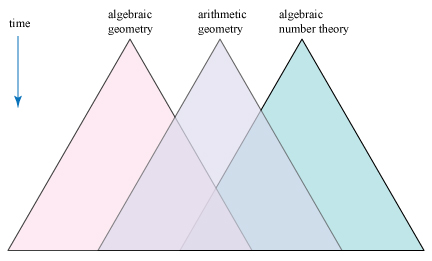I am not sure I really agree with the following quote (which is the opening paragraph of Modular forms and Galois cohomology by H.Hida) because I suspect that a mathematician valuing creativity and versatility in approaches (surely true about Hida) will tend to consider his own field as uniquely amenable to this way of thinking, and conversely for a mathematician valuing the overall coherence of a given theory (Grothendieck comes to mind). Nevertheless, I think it is beautifully written and thought-provoking.
Traditionaly, mathematical research has been classified by the method mathematicians exploit to study their research areas. For example, algebraists study mathematical questions related to abstract algebraic systems in a purely algebraic way (only allowing axioms defining their algebraic systems), differential geometers study manifolds via infinitesimal analysis, and algebraic geometers study geometry of algebraic varieties (and its siblings) via commutative algebras and category theory. There are no central techniques which distinguish number theory from other subjects, or rather, number theorists exploit any techniques available to hand to solve problems specific of number theory. In this sense, number theory is a discipline in mathematics which cannot be classified by methodology from the above traditional viewpoint but it is just a web of rather specific problems (or conjectures) tightly and subtly knit to each other. We just study numbers, those simple ones, like integers, rational numbers, algebraic numbers, real and complex numbers and $p$-adic numbers, and that is it.
Certainly, my impression is that the growing overlap you describe largely reflects the fact that a result will be classified as arithmetic geometry if it has an impact on some problems which are already classified as arithmetic geometry, and this however remote the former statement seems to be from arithmetic geometry. To take a specific example, Peter Scholze proved that the adic spectra of a perfectoid algebra and its tilt (whatever that means) are homeomorphic, a result which surely belongs to analytic topology by any reasonable standard. Because this is a crucial step in the proof of part of the weight-monodromy conjecture, a defining problem in arithmetic geometry, and in the construction of Galois representations attached to automorphic forms, another defining problem in arithmetic geometry, this will surely be classified as standard arithmetic geometry in the future.
It turns out that the defining problems of arithmetic geometry seem to require a subtle mix of advanced techniques coming from many different subfields (sometimes to the surprise of the very mathematicians who formulated them in the fist place) so that people motivated by these problems will 1) come from rather diverse backgrounds and 2) necessarily strive to master all the required areas, therefore increasing the overlap. In particular, I think that the very nature of the field makes it very hard to find a recent significant advance in arithmetic geometry which would not draw extensively upon several different other fields.
As to whether modern advances are increasingly drawn from these field intersections, I think that this may reflect the sociological structure of the mathematical society. Partly for historical reasons, partly because of sociological inertia (talented famous people have talented students) and probably partly because some of these problems at least did prove incredibly fruitful (but as I work in this field, I don't want to mistake my feelings for an objective assessment), the defining problems of arithmetic geometry have reliably attracted some of the best mathematical minds of each generations. A handful of them have even gained general cultural status. So certainly a disproportionately high number of Abel prizes, Fields medals and NYT articles about maths are about problems lying in the intersections you drew.
That said, what is true for arithmetic geometry is less so for algebraic geometry, as far as I can tell, and I know plenty of outstanding mathematicians in that field who do very exciting work but who do not seem to be really moving closer to arithmetic geometry in any meaningful sense. Claire Voisin comes to mind. So I suspect more knowledgable people than me would find counterexamples in that field.

